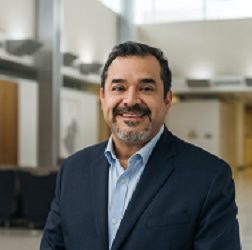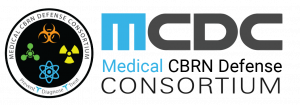
Ricardo Carrion Jr., Ph.D.
Large / Non-Profit Business Representative
Texas Biomedical Research Institute
For the last 18 years Dr. Carrion has performed research in the biosafety level 4 laboratory at Texas Biomed. Being manager/associate director of the lab, and now Director of MCCR, during those years has provided him the opportunity to conceive and implement novel approaches to meet diverse research needs. Dr. Carrion have leveraged collaborative grants and contracts to facilitate the development and characterization of hemorrhagic fever (HF) models. These HF models proved essential for advanced preclinical development of vaccines and therapies to hemorrhagic fever viruses. Additionally, introducing enhancements to laboratory infrastructure, including implementing point of care diagnostics, including hematology, clinical chemistry and coagulation instrumentation, real-time RT-PCR for trigger-to-treat studies, continuous real-time monitoring of physiological parameters via telemetry, and ventilated enclosures for large animals has expanded the breadth of information collected during a study, as well as enhanced animal welfare. Over the last ten years, Dr. Carrion has focused on developing well-characterized animal models for conducting filovirus efficacy studies in nonhuman primates. He and his team have advanced several filovirus vaccine platforms that are currently in human trials using Ebolavirus (EBOV) nonhuman primate models. Dr. Carrion was the first to use marmosets in a BSL-4 laboratory for studies on Lassa fever, Marburgvirus and EBOV. His team has extended the high containment model of marmosets to include studies Eastern Equine encephalitis (EEE) virus. He is also interested in the discovery and validation of broad-spectrum therapies to highly pathogenic agents. This includes validating candidate antivirals identified in high throughput screening in rodent hemorrhagic fever models, as well as testing novel compounds in nonhuman primate models of EBOV disease. Dr. Carrion has several research projects including investigating filovirus evolution, developing novel detection system for biothreats, as well as identifying surrogates of protection for efficacious EBOV vaccines. Most recently, Carrion and his colleagues have been focused on characterizing SARS-CoV-2 in both rodent and NHP models. Recently, he was awarded contracts to test the efficacy of several vaccine platforms and therapeutics against SARS-CoV-2 in these COVID 19 models. As his BSL4 research program expanded, the need to streamline the interdepartmental processes of acquiring animals and transitioning them to BSL-4 research projects quickly became apparent. Dr. Carrion led a team that established standard operating procedures (SOPs) and
harmonized existing SOPs across scientific and veterinary units. The standardization of these processes led to efficiency of operations and helped to spur the growth of research programs in the 1200 sq ft BSL-4 space, which resulted in annual studies in excess of $15M. In addition, he generated a fee structure for BSL-4 activities that is currently used for DOD and NIH grants and contracts as well as commercial contracts.
A thriving research program requires vigilance with regards to compliance and quality standards. Dr. Carrion headed efforts to develop best practices for select agent research involving animals including processes for training staff on handling of select agents, and an electronic select agent tracking system for documenting the storage and use of biological select agents and toxins. For managing the issues surrounding advance preclinical development of countermeasures, he established a “well-documented” studies program to ensure the
integrity and quality of data. Among the processes developed were those that defined procedures for conducting research that would support licensure of therapeutics or vaccines via the FDA animal rule. Currently, Dr. Carrion is leading an effort to implement a part 11 compliant laboratory information management systems to facilitate submission of IND applications. Moving countermeasures forward via the FDA two animal rule will require qualified animal models, he has been recently awarded NIH funding to support qualification of filovirus animal models as well as near pivotal studies involving vaccines and therapies for filovirus induced disease. By engaging stakeholders to identify shared values, Dr. Carrion was able to lead a diverse team composed of scientists, veterinary care staff, laboratory technicians, and quality personnel across scientific units to expand my research program.
